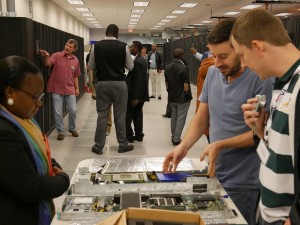 On the second workshop afternoon, delegates were offered a choice between technical and outreach tracks. The technical track was offered by Tommy Minyard, TACC’s Director of Advanced Computing Systems. Minyard addressed issues that workshop participants requested, including security and system provisioning. Additional TACC HPC staff spoke about tools that TACC has developed in-house for system monitoring and user support, including TACC-stats, LOSF, PerfExpert and Lmod.
On the second workshop afternoon, delegates were offered a choice between technical and outreach tracks. The technical track was offered by Tommy Minyard, TACC’s Director of Advanced Computing Systems. Minyard addressed issues that workshop participants requested, including security and system provisioning. Additional TACC HPC staff spoke about tools that TACC has developed in-house for system monitoring and user support, including TACC-stats, LOSF, PerfExpert and Lmod.
The outreach track visited Texas Alliance for Minorities in Education (TAME) program Director Linda Collins for a tour of the mobile “Trailblazer I” unit that is also located on the University of Texas’ J.J. Pickle Research Campus in Austin. The delegates who toured Trailblazer are from rural villages in South Africa, Zimbabwe, Zambia, Lesotho, and Tanzania. Most have teaching and systems administration responsibilities, and all are interested in human capacity development.

Researchers who participated in the outreach track of TACC’s workshop.
The mobile Trailblazer I and II units tour the Texas countryside visiting students, teachers and families. Inside are stations featuring science and engineering demonstrations designed to engage critical thinking processes, inspire innovation and enlighten guests to a range of tech-enabled possibilities. As the SADC group toured, they began to think of ways the experience could be adapted for sub-Saharan Africa, and to include age-appropriate HPC training. For example, the addition of a Raspberry Pi training cluster, collection of tablets (packed tightly in a small space), and science case studies that resonate with each region’s industrial footprint would ensure commercial buy-in from companies with a vested interest in a well-prepared, and customized workforce. Perhaps the unit could serve as a network point-of-presence, and collect its own power? Then, in the evenings when it’s cooler, a mobile laboratory could become a learning oasis where teachers, students and families converge to socialize, and discover how #HPCTransforms.Following the workshop at TACC, the participants attended tutorials and workshop sessions, papers, panels and “Birds of a Feather” sessions (BOFs), as well as visit the exhibit floor at SC15. They were overwhelmed with the information and technologies presented during the week, but went home with fresh perspective and some new ideas and plans for future HPC development in their respective countries.
The SADC activity was sponsored by the U.S. National Science Foundation and TACC, with help from the South AfricanCenter for High Performance Computing (CHPC), Airlink Airlines, Intel, Cray, DataDirect Networks, SC15, and STEM-Trek.
